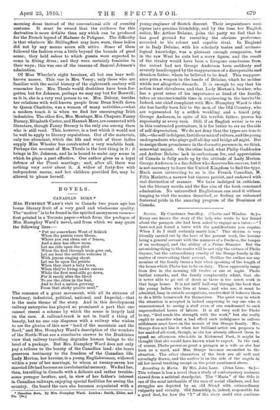NOVELS.
CANADIAN BORN.*
MRS. HIIMPHRY WARD'S visit to Canada two years ago has borne literary fruit of a very good and wholesome quality. The" motive" is to be found in the spirited anonymous verses— first printed in a Toronto paper—which form the prologue of Mrs. Humphry Ward's novel% and from which we may quote the following lines:— "Put me somewhere West of Selkirk
When the prairie roses bloom, Where you run clean out o' fences, And a man has elbow room.
Let me ride upon the pilot When the first through train goes out, Let me hear the settlers welcome it With joyous ringing shout.
Let me be upon the prairie When they start a baby town, When they're living under canvas While the first mud-sills go down, For it rarely stirs the blood To see the cities in the bud, And to feel a nation growing From that sticky prairie mud."
The romance of a great movement, with all its streams of tendency, industrial, political, national, and Imperial,—that is the main theme of the story. And in this development railway enterprise has played so prominent a part that one cannot resent a scheme by which the scene is largely laid on the cars. A railroad-track is not in itself a thing of beauty, but no one can dispense with a railway who wishes to see the glories of this new " land of the mountain and the flood," and Mrs. Humphry Ward's description of the wonders of the North-West are a conclusive answer to the Ruskinian view that railway travelling degrades human beings to the
level of a package. But Mrs. Humphry Ward does not only pay a tribute to the beauty of the Canadian land.: she bears
generous testimony to the freedom of the Canadian life. Lady Merton, her heroine, is a young Englishwoman, widowed within a year of her marriage, to whom at twenty-seven her married life had become an insubstantial memory. We find her, then, travelling in Canada with a delicate and rather trouble- some younger brother, and, in view of her father's interest in Canadian railways, enjoying special facilities for seeing the country. On board the cars she becomes acquainted with a
• Canadian Born. By Mrs. Humphry Ward. Londoni Smith, Elder, and Co. [6e.] young engineer of Scotch descent. Their acquaintance soon ripens into genuine friendship, and by the time her English suitor, Mr. Arthur Delaine, joins the party we feel that he has good ground for resenting the obvious preference accorded to his robust and capable rival. In England or in Italy Delaine, with his scholarly tastes and !archaeo- logical knowledge, was a pleasant enough companion, but in the raw West he cuts but a sorry figure, and the result of the rivalry would have been a foregone conclusion from the outset had not George Anderson been suddenly and severely handicapped by the reappearance of a disreputable and drunken father, whom he believed to be dead. This reappear- ance puts a weapon in the hands of Delaine, which he neither wields nor altogether discards. It is enough to say that his action is not chivalrous, and that Lady Merton's brother, who- has a great sense of his importance as head of the family,. takes an unconscionable time in acquiescing in the inevitable. Indeed, our chief complaint with Mrs. Humphry Ward is that she has hardly been fair to the men of the Old Country, who are represented by a selfish weakling and a timid prig. George Anderson, in spite of his terrible father, proves his superiority at every turn. Still, if an English writer is to eir in this contrasted portraiture, it is far better to err on the side of self-depreciation. We do not deny that the types are true to life,—the self-indulgent, fastidious man of culture, and the young undergraduate who plays golf all day and bridge all night. But to assign them prominence in the dramatis personae is, we think, somewhat unjust. On the other hand, what Philip Gaddesden and Arthur Delaine lack in enthusiasm for, and appreciation: of Canada is fully made up by the attitude of Lady Merton. George Anderson is a fine fellow wlio -deserves- his success, but it is not necessary to leave-the United Kingdom to find the type. Much more interesting to . us is _the French Canadian, M. Felix Mariette, a narrow but sincere patriot, and endowed with real distinction of manner. We have indulged in criticism, but the literary merits and the fine aim of the book command admiration. No untravelled Englishman can read it without longing to visit the scenes described, or feeling an enhanced fraternal pride in the amazing progress of the Dominion of Canada.














































 Previous page
Previous page